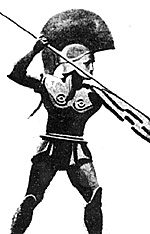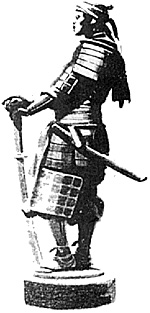
 After the Trojan War had ended with the fall of Troy, while Ulysses was still wandering through the Mediterranean and presumed dead, some 3,000 years ago, the suitors gathered about Ulysses' palace seeking the hand of Penelope, his wife, whiled away their time playing chess. One mediaeval scholar claimed that Ulysses invented chess. Homer's sketchy description
of this game is perhaps the oldest written reference to chess in history, and the game may well be far older than that. It was played in Scheherazade's famous stories of ancient Persia, The Thousand and One Nights, by princes and warriors. Some say it came to Persia from even more ancient India.
After the Trojan War had ended with the fall of Troy, while Ulysses was still wandering through the Mediterranean and presumed dead, some 3,000 years ago, the suitors gathered about Ulysses' palace seeking the hand of Penelope, his wife, whiled away their time playing chess. One mediaeval scholar claimed that Ulysses invented chess. Homer's sketchy description
of this game is perhaps the oldest written reference to chess in history, and the game may well be far older than that. It was played in Scheherazade's famous stories of ancient Persia, The Thousand and One Nights, by princes and warriors. Some say it came to Persia from even more ancient India.
Its name is Persian, certainly: a corruption of the word shah or king. The game's final blow, checkmate, derives from the Persian phrase, shah niat, the king is dead. Mohammedan conquerors carried chess from Persia across Africa and into Spain, and it spread from there across Europe like a brush fire through the Dark Ages and into mediaeval times. It came by its modern rules in the fifteenth century. The ancient Japanese game of Go developed about the same time.
Like war itself, of which it is a miniature, chess is an accomplishment of all nations and all races. Unlike war, it is man-to-man combat stripped of all physical elements, and reduced to a pure intellectual struggle between minds. Unlike war, it reaches a decision that admits of no argument: shah mat, checkmate.
In its intellectual aspects, at least, chess is cousin to modern computer war gaming. But in the centuries bemeen the two, many men have tried to make war gaming nwre realistic, with all the physical trappings of the real battle, except wounds and sudden death. This booklet traces sorne of the outstanding developments in this long search for the perfect war game, using the master game of them all as its symbol.
This is the first of a series of re-prints from a booklet THE GAME OF WAR, pubulished some 15 years ago by TECHNICAL OPERATIONS INCORPORATED of Burlington, Massachusetts, U.S.A., who have kindly given permission for its reproduction. There will be another chapter next month.
Back to Table of Contents -- Wargamer's Newsletter # 154
To Wargamer's Newsletter List of Issues
To MagWeb Master Magazine List
© Copyright 1975 by Donald Featherstone.
This article appears in MagWeb (Magazine Web) on the Internet World Wide Web.
Other military history articles and gaming articles are available at http://www.magweb.com